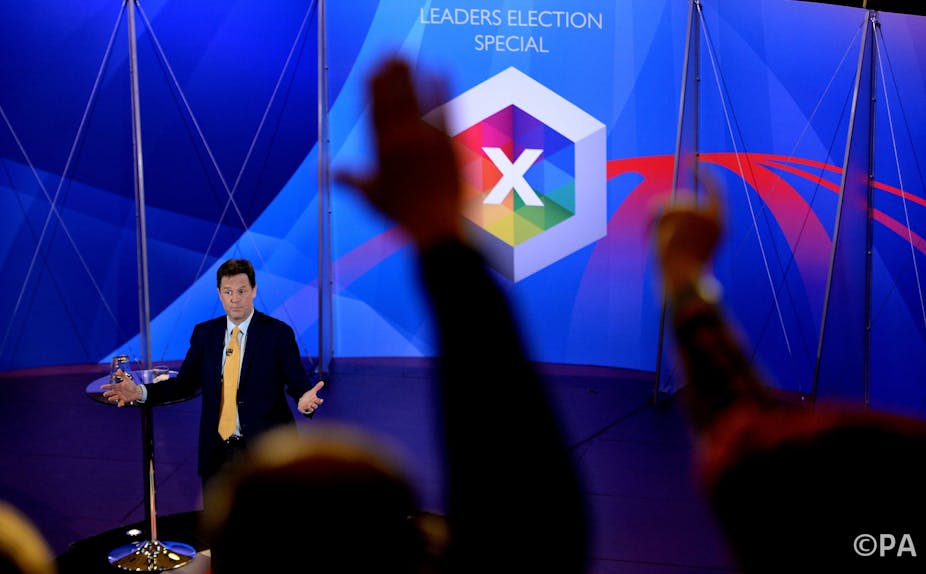Twitter has become a public sounding board where views are broadcast, repeated or repudiated, and we can dip into this pool of public opinion in order to get a flavour of how the parties stand in the run up to the election.
Analysing hundreds of thousands of individual tweets is a challenge, for which we developed VoteBEE, an app based on the EMOTIVE textual analysis engine that can read and track the emotional outpour on Twitter in near-real time. EMOTIVE has proven able to very accurately identify fine-grained emotions from tweets, extracting direct emotional expressions of anger, disgust, fear, happiness, sadness, surprise, shame and confusion.
So how, according to this emotional swing-o-meter, have the party leaders fared over the campaign and in the live television debate?
David Cameron

The “fear factor” (dark green) represents the Tories’ aim of painting the SNP as damaging to the rest of the UK outside Scotland should they partner with Labour in the event of a hung parliament.
Sadness (dark blue) towards Cameron was declining, but since the BBC Question Time leaders’ debate has increased. Now the Twittersphere believes Cameron is a weak leader who is only interested in his career, as per his latest gaffe. Sadness also points to feelings of distress in the Tories opponents should they be re-elected, especially in respect of what this will mean for Europe, the UK, and low wages.
Yet there are signs of happiness for the Tory camp with many thinking Miliband performed poorly, despite Cameron not putting a good case forward – more of a case of winning by default.
Ed Milliband

Miliband has attracted a steady wave of anger (red) throughout the campaign, especially recently after failing to pacify a very angry woman during a radio show phone in.
However, in recent days there has been a lot of shame (light green) on Miliband’s emotional spectrum. Many feel he is getting a hard deal and that “it is a great shame” he’s failed to win the backing of Murdoch and his newspapers – which have come out in support of Cameron in England and the SNP in Scotland.
Perhaps that’s why Miliband has turned to Russell Brand for support – unfortunately the Twittershpere was not impressed, and this added to the shame associated with Miliband.
As with the Tories, Labour has also has a fear factor (dark green). Labour, with a little help from the Lib Dems, has highlighted that the Tories will cut welfare, with child benefits likely in the firing line.
Nick Clegg

Despite having been part of the coalition government, Clegg’s emotional spectrum is muted compared to the other leaders. Fear (dark green) featured early on in the campaign, but this fear was coming from the Tories – they needed Clegg to do well in order to renew theiri coalition. However there was also fear that Clegg would team up with anyone just to be back in power.
There were peaks of happiness (yellow) and surprise (light blue) following the Question Time leaders debate. Surprise came from how Clegg handled a previous questioner:
Such sarcastic invocations of happiness may bring back warm memories for many, but I’m sure Clegg will see it as more of a nightmare. The surprise (light blue) stemmed from Clegg being declared the winner of the debate – something no one was expecting. There might still be a chance that his party will rally supporters nearer the day of the election.

The campaign has invoked similar ranges and scales of emotions towards the main three parties’ leaders, and we don’t have long to wait to see how well their trump cards have worked in trying secure the electorate’s vote.

